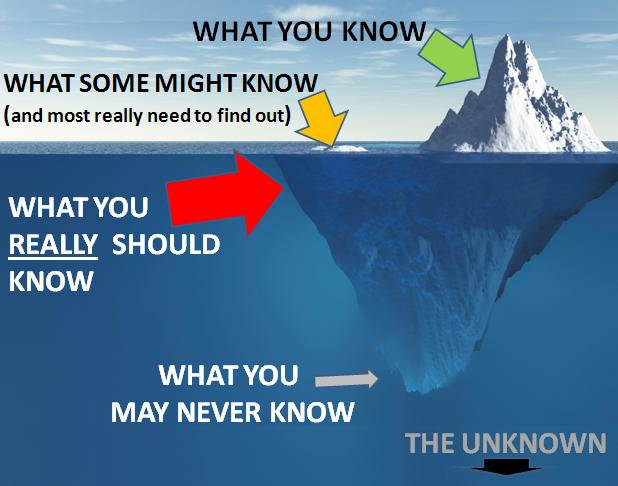


Let’s begin with Archimede’s principle on buoyant force:
where Fb is the buoyancy, rho is the density of water, V is the volume of ice immersed in the water. To keep balance, this force should be equal to the gravity, which is:
If we substitute the density of ice by 0.92 g/cm^3 and water by 1 g/cm^3, we get  . In other words, the visible ice floating on the water is only 8% of its total volume.
. In other words, the visible ice floating on the water is only 8% of its total volume.
Interestingly, the Iceberg Theory, or the theory of omission, was coined by American writer Hemingway in 1923. His iceberg theory highlights the symbolic implications of art. He wrote in “the art of the short story”:
You could omit anything if you knew that you omitted, and the omitted part would strengthen the story and make people feel something more than they understood.If you leave out important things or events that you know about, the story is strengthened. If you leave or skip something because you do not know it, the story will be worthless.
It is totally opposite to my previous understanding, which thought the invisible part is unintentional. Nevertheless, Hemingway has such a deep insight that how human perceive the world and construct his story in the same way. It’s something so deep in mind that people tend to believe his own conclusion.
1958 interview by Paris review
The journalist George Plimpton, tried to ask every details of what is in Hamingway’s mind when he is writing. However, he finds it difficult to talk about writing, he feels so strongly that such ideas should remain unexpressed, not be spooked by such questions.
He prefers not to talk about them (some superstitions things cheer him up), feeling that whatever value they may have can be talked away.
that though there is one part of writing that is solid and you do it no harm by talking about it, the other is fragile, and if you talk about it, the structure cracks and you have nothing.
Writing is a private, lonely occupation with no need for witnesses until the final work is done.
some habits are worth noting:
- he stands when he writes
- he keeps track of his daily progress, so as not to kid himself
- write every morning as soon after first light as possible. No one disturb you at that time. You can start from 6 to noon until you feel empty mind.
- discipline is acquired
- I have worked well everywhere…The telephone and visitors are the work destroyers.
- Once writing become your major vice and greatest pleasure, only death can stop it.
- Financial security can keep you from worrying, which destroy the ability to write.
When do you decide to become a writer?
I always wanted to be writer
The fun of talk is to explore. All that is irresponsible should not be written. Once written you have to stand by it.
Some writers can hold teaching positions. I could not do it… Trying to write something of permanent value is a full-time job even though only a few hours a day are spent on the actual writing.
A writer can be compared to a well…It’s better to take a regular amount out than to pump the well dry and wait for it to refill.
(I see I am away from the question, but the question was not very interesting). when you ask someone old,tired questions, you are apt to receive old tired answers.
The further you go in writing the more alone you are.
A close knowledge of works on the list help fill your “well”?
They are part of learning. **Nobody knows what it is made of, least of all yourslef.
the symbols in your novels?
If you don’t mind, I dislike talking about them and being questioned about them. If there are good explainers, why should I deprive their job?… Read for the pleasure of reading it. Whatever else you find will be the measure of what you brought to the reading
I still belive it’s very bad for a writer to talk about how he writes.
How am I going to write it if you don’t leave me alone?
Do you work out the whole plan before you start?
I knew what was going to happen in principle. But I invented what happened each day I wrote
Do you think a writer ‘s power diminishes as he grows older?
I don’t know about that. People who know what theyare doing should last as long as their heads last.
Do the titles come to you while you’re in the process of doing the story?
The title comes afterwards
I always try to write on the principle of the iceberg… so that the reader read something it will become a part of his experience and seem actually to have happened
How soon do can you write about it in fictional terms from an experience (air crashes)?
There is no rule about how soon one should write about it.
Everyone has his own conscience, and there should be no rules about how a conscience should function.
would you sy your work reflects one or two ideas?
The man who said it possibly had only one or two ideas.
What do you think is the function of your art?
why be puzzled by that?From everything that happened, you know and unknown, you make something through your invention that is not a representation but a whole new thing truer than anything true and alive, and you make it alive, and if you make it well enough, you give it immortality.